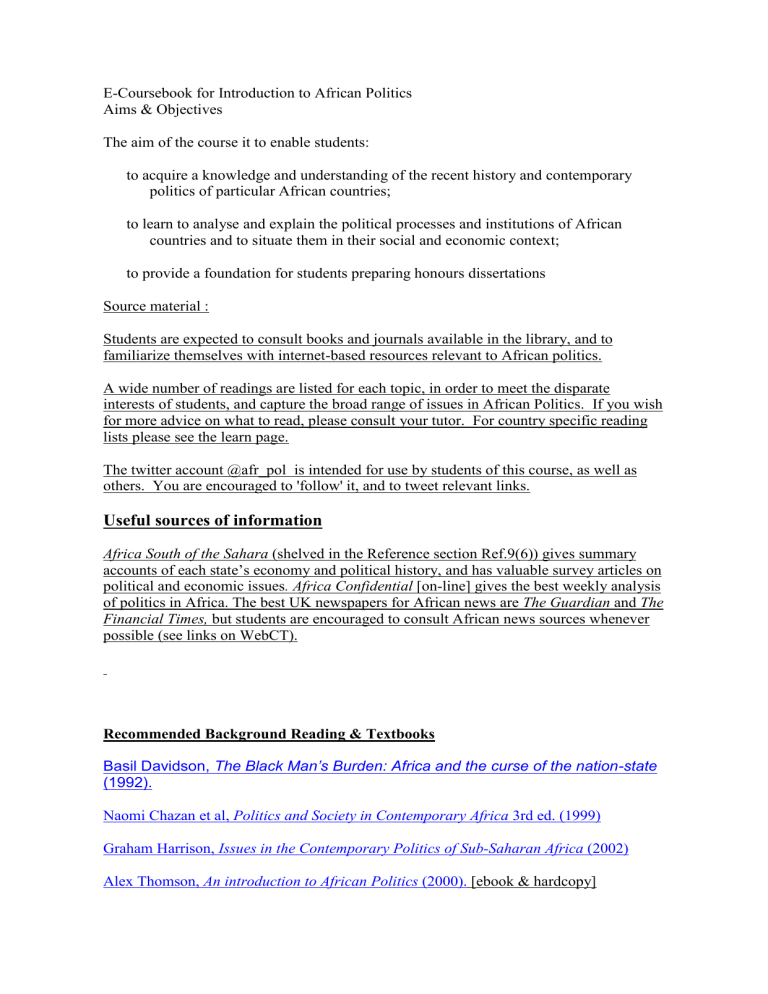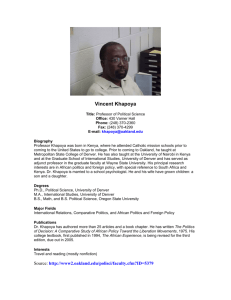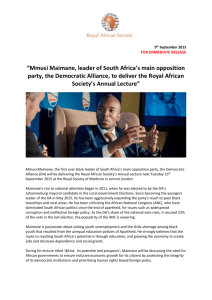E-Coursebook for Introduction to African Politics

E-Coursebook for Introduction to African Politics
Aims & Objectives
The aim of the course it to enable students: to acquire a knowledge and understanding of the recent history and contemporary politics of particular African countries; to learn to analyse and explain the political processes and institutions of African countries and to situate them in their social and economic context; to provide a foundation for students preparing honours dissertations
Source material :
Students are expected to consult books and journals available in the library, and to familiarize themselves with internet-based resources relevant to African politics.
A wide number of readings are listed for each topic, in order to meet the disparate interests of students, and capture the broad range of issues in African Politics. If you wish for more advice on what to read, please consult your tutor. For country specific reading lists please see the learn page.
The twitter account @afr_pol is intended for use by students of this course, as well as others. You are encouraged to 'follow' it, and to tweet relevant links.
Useful sources of information
Africa South of the Sahara (shelved in the Reference section Ref.9(6)) gives summary accounts of each state’s economy and political history, and has valuable survey articles on political and economic issues .
Africa Confidential [on-line] gives the best weekly analysis of politics in Africa. The best UK newspapers for African news are The Guardian and The
Financial Times, but students are encouraged to consult African news sources whenever possible (see links on WebCT).
Recommended Background Reading & Textbooks
Basil Davidson, The Black Man’s Burden: Africa and the curse of the nation-state
(1992).
Naomi Chazan et al, Politics and Society in Contemporary Africa 3rd ed. (1999)
Graham Harrison, Issues in the Contemporary Politics of Sub-Saharan Africa (2002)
Alex Thomson, An introduction to African Politics (2000).
[ebook & hardcopy]
William Tordoff, Government and politics in Africa 4th ed. (2002).
Tom Young, ed. Readings in African Politics (2003)
Websites: www.mg.co.za
Mail& Guardian Newspaper – South Africa www.allafrica.com
news stories from many African newspapers www.africaaction.org
Africa Policy Electronic Distribution List: www.irinnews.org
UN's IRIN humanitarian information unit www.afrika.no
The Norwegian Council for Africa www.lib.utexas.edu/maps/africa.html
online map library www.sas.upenn.edu/African_Studies/ website with excellent links www-sul.stanford.edu/depts/ssrg/africa/poli1.html
excellent links - politics
Assessment
10% tutorial participation
Participation is to be assessed on a tutorial presentation. Each student will be assigned one reading for the course which they will asked to introduce at the beginning of a designated tutorial.
40% essay:
The essay assessment will be based on a 2000 word literature review, on one of the weekly themes of the course, or, another topic agreed by the course convenor.
50% exam: Time and place to be announced by Registry
Please see the ‘Honours Handbook’ for further information on submission of coursework; ‘Late Penalty Waivers’; plagiarism; learning disabilities, special circumstances; common marking descriptors, re-marking procedures and appeals
Lessons
Week 1: introduction to the course
Crawford Young.The African colonial state in comparative perspective
(1994)
Basil Davidson, The Black Man’s Burden: Africa and the curse of the nation-state (1992).
Naomi Chazan et al, Politics and Society in Contemporary Africa 3rd ed.
(1999)
Graham Harrison, Issues in the Contemporary Politics of Sub-Saharan
Africa (2002)
Alex Thomson, An introduction to African Politics (2000).
[ebook & hardcopy]
William Tordoff, Government and politics in Africa 4th ed. (2002).
Tom Young, ed. Readings in African Politics (2003)
17 September 2012
Week 2: Colonialism and the post-colonial state
Questions to think about:
Which label best identifies the colonial state? Young’s Bula Matari? Or Cooper’s
Gate-keeper?
Labour extraction was central to the colonial state’s mandate, what have been the implications of this for the post-colonial states and economies?
&νβσπ;
Why did ethnicity become so central to the colonial project?
24 September 2012
Week 3: States and regimes in post-colonial politics
Questions to think about:
&νβσπ;
Does it make sense to speak of ‘African’ politics?
What does it mean to understand African politics?
Is Africa descending into chaos?
01 October 2012
Week 4: Nationalism and Nationalist Movements
Questions to think about:
What did/does ‘nationalism’ actually mean in Africa? Did it mean something different to the Mau-Mau fighters? To Jomo Kenyatta?
What is the difference between ethnicity and nationalism in Africa?
Is Afrikaner nationalism also African nationalism?
Was Afrikaner nationalism inspired by material need or primordialism?
&νβσπ;
Were the divisions in South African Black Nationalism generational, ideological or personal?
Is post-colonial nationalism a politically significant force?
08 October 2012
Week 5: Ethnicity
Questions to think about:
Is ethnicity best understood as primordial or invented? What are the implications
of this choice?
How does ethnic politics in Africa differ from elsewhere?
What triggered the Rwandan genocide?
15 October 2012
Week 6: Elections
Questions to think about:
Are African elections primarily determined by clientelism?
Does monitoring help or hinder democratisation? Whose benefit does it serve?
22 October 2012
Week 7: Authority & Accountability: Leadership in Africa
Questions to think about:
Why has it proved so difficult to hold African leaders accountable?
Why are succession debates and term-limits so controversial in Africa?
Is ‘traditional leadership’ compatible with democracy?
Is there space for women’s representation with so many ‘big men’ around?
Why have women’s movements found it so difficult to participate in decisionmaking?
29 October 2012
Week 8: Corruption
Questions to think about:
Is corruption simply the way ‘Africa works’?
How do different African countries experience corruption?
How does corruption reflect power and authority structures in African states?
05 November 2012
Week 9: Civil Society I: Power & Politics of Religion
Questions to think about:
Why is religion of ten a point of political mobilization in Africa?
How can we best understand the relationship between religion and politics in
Africa?
Is Christianity a potent force for democratization in Africa?
12 November 2012
Week 10: Civil Society II: Class politics, Trade Unions and Civic Resistance
Questions to think about:
How has neoliberalism impacted on African politics?
Can Marxism add to our understanding of African politics?
What potential do trade unions hold for transforming African politics?







